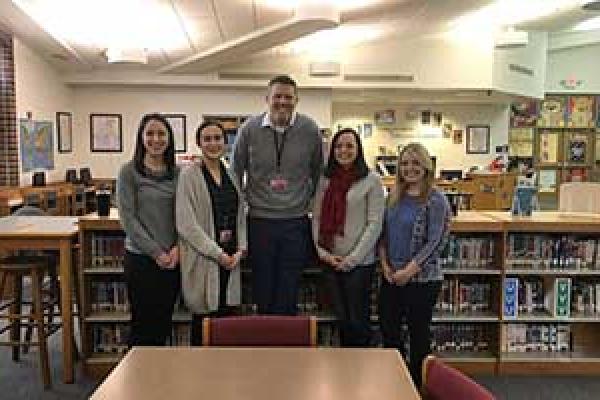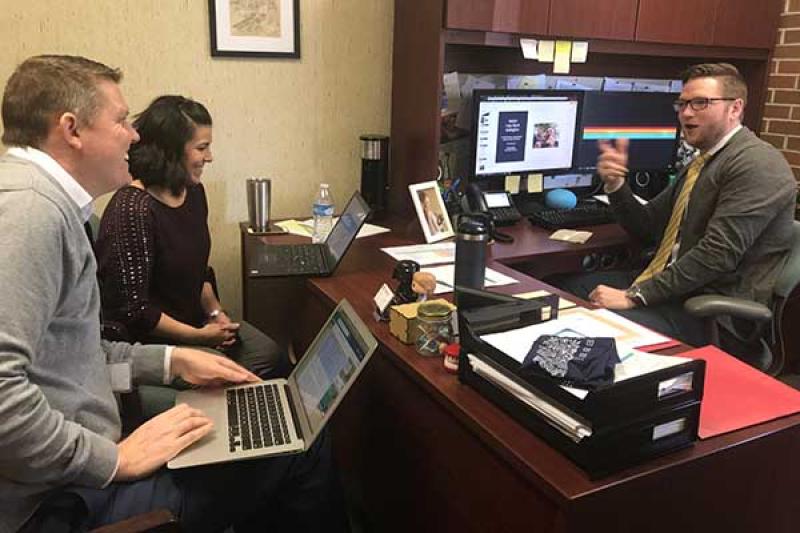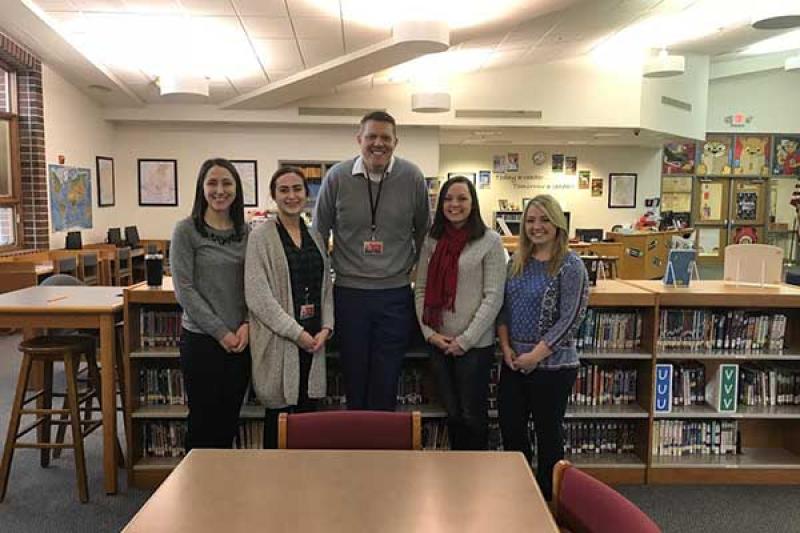Griffin and team get reading right for Marysville kids

Steven Griffin (MA, ‘98) is making his mark on Marysville. The Speech and Hearing Science alumnus and department lecturer also holds the position of Director of Literacy at Marysville Exempted Village School District.
Griffin’s position was created to help the district better respond to and prevent student reading problems. In the 2015-16 school year, Marysville earned a D on its state report card for K-3 literacy improvement. Since then, Griffin and the Marysville team managed to bring that D up to a B, and the district is now referred to as “a lighthouse of education innovation.”
We sat down with Griffin to learn how he and his team were able to “get reading right for kids,” setting them up for success for the rest of their lives, and how the Department of Speech and Hearing Science has been there every step of the way.
Tell us a bit about your career path since graduating from Ohio State.
I graduated from the Speech and Hearing Science Department in 1998, and I’m now in my 20th year in public schools. I have worked in multiple capacities across several schools, but I’ve always been involved in literacy. I’m now in my fourth year as Literacy Director at Marysville Schools.
What is it like to work for Marysville Schools?
I love Marysville. My four years here have been my best four years of my career. I love our team and working for our superintendent. We have tremendous teachers and students. The parents and the community are very supportive of the schools. Marysville wraps around kids really well, and I’m blessed to be in this role.
How did your time in the Speech and Hearing Science Department prepare you for this role?
My time at Ohio State was invaluable. Not only for my education, but for the relationships I forged there, as well. My grad school experience taught me how to think clinically, which is an essential skill set if you want to personalize reading instruction for students. I also met my professional mentor at Ohio State, Dr. Wayne Secord. It is accurate to state I wouldn’t be where I am today without Dr. Secord. He has mentored and supported me since the moment I stepped foot in the field.
The many relationships I’ve developed at the university's speech and language clinic have, without question, contributed greatly to my success as a professional. In many ways, I owe everything to Ohio State.

Griffin, Kristen Jones, student services coordinator and Mark Gallagher, district MTSS coordinator, collaborate to design personalized reading curriculums for each Marysville student.
Your team at Marysville was able to achieve incredible improvements in literacy in just a few years. What did you and your team do differently?
There were many good practices in place before I arrived, but simply put, we shifted from a curricular to a diagnostic model. This shift made a big difference for our struggling and dyslexic readers. It began with getting our screenings and data collection more aligned to evidence-based practice. It’s hard to personalize reading instruction without capturing specific student reading profiles and having MTSS (multi-tiered systems of support) systems in place so teaching and learning can be impacted. Collaboratively, we were able to bring these practices to life in our schools.
How does Marysville personalize reading instruction?
We don’t subscribe to what I call “faith-based reading instruction,” where we want to “believe” there is one, correct way to teach a student how to read. This avoidance of reading wars allows us to stay student-focused, not program-focused. We look at the individual student, their reading profiles, their strengths and weaknesses and we design a personalized reading curriculum. In a nutshell, we use a clinical decision-making framework. I was trained to think this way at Ohio State, and I learned to do it collaboratively with other professionals. By collaborating with my Marysville team and our teachers, we’ve been able to take the clinical decision-making model and scale it for an entire school district. The end result is higher student reading achievement and kids who can read and want to pick up books.

Griffin poses with current Marysville speech-language pathologists, former students and Speech and Hearing Science Department alumni: Adrienne Darah (BA, 2013, MA, 2016), current Speech and Hearing Science graduate student Nicole Deley, Holly Wiess (BA, 2005, MA, 2007) and Alexis Wilson (BA, 2015, MA, 2017)
As a lecturer in the Department, what lessons do you bring in from the field and try to impart on your students?
A lot of our graduate students haven’t been in an elementary school since they were elementary school students, so I try to bring the schools to them. To operate effectively within the public schools, your skillset has to be wide-ranging and varied. Your soft skills and your leadership skills are just as important as your clinical skills in the schools. You interact with hundreds of different people per week from age 5 to age 65. Getting our graduate students ready to navigate the complex ecosystem of a public-school system is the priority.
At the end of the day, kids are counting on them, so I want our Ohio State graduate students to not just survive, but thrive in the public school environment.
What have been some of your proudest moments as a lecturer?
I find a lot of joy in giving back to the department, interacting with the students and helping them succeed in the field. The grad students are near and dear to my heart. Dr. Secord and others took the time to help me out when I was a grad student, so I try to “pay it forward” anytime I can. Three former students of mine actually work as speech-language pathologists in Marysville now. I’m simply grateful for the people at the Speech and Hearing Science Department and the relationships we’ve maintained for 20 years now. When I take time to reflect, I hope I’ve been able to make the kind of difference in my student’s careers that Ohio State has certainly made on mine. That would make me proud.
